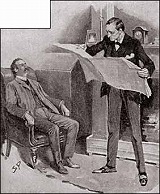“Yes,” said he, “there is no better way of approaching it. The situation is desperate, but not hopeless. Even now, if we could be sure which of them has taken it, it is just possible that it has not yet passed out of his hands. After all, it is a question of money with these fellows, and I have the British treasury behind me. If it’s on the market I’ll buy it - if it means another penny on the income-tax. It is conceivable that the fellow might hold it back to see what bids come from this side before he tries his luck on the other. There are only those three capable of playing so bold a game - there are Oberstein, La Rothiere, and Eduardo Lucas. I will see each of them.”
I glanced at my morning paper.
“Is that Eduardo Lucas of Godolphin Street?”
“Yes.”
“You will not see him.”
“Why not?”
“He was murdered in his house last night.”
My friend has so often astonished me in the course of our adventures that it was with a sense of exultation that I realized how completely I had astonished him. He stared in amazement, and then snatched the paper from my hands. This was the paragraph which I had been engaged in reading when he rose from his chair.
MURDER IN WESTMINSTER
A crime of mysterious character was committed last night at 16 Godolphin Street, one of the old-fashioned and secluded rows of eighteenth century houses which lie between the river and the Abbey, almost in the shadow of the great Tower of the Houses of Parliament. This small but select mansion has been inhabited for some years by Mr. Eduardo Lucas, well known in society circles both on account of his charming personality and because he has the well-deserved reputation of being one of the best amateur tenors in the country. Mr. Lucas is an unmarried man, thirty-four years of age, and his establishment consists of Mrs. Pringle, an elderly housekeeper, and of Mitton, his valet. The former retires early and sleeps at the top of the house. The valet was out for the evening, visiting a friend at Hammersmith. From ten o’clock onward Mr. Lucas had the house to himself. What occurred during that time has not yet transpired, but at a quarter to twelve Police-constable Barrett, passing along Godolphin Street, observed that the door of No. 16 was ajar. He knocked, but received no answer. Perceiving a light in the front room, he advanced into the passage and again knocked, but without reply. He then pushed open the door and entered. The room was in a state of wild disorder, the furniture being all swept to one side, and one chair lying on its back in the centre. Beside this chair, and still grasping one of its legs, lay the unfortunate tenant of the house. He had been stabbed to the heart and must have died instantly. The knife with which the crime had been committed was a curved Indian dagger, plucked down from a trophy of Oriental arms which adorned one of the walls. Robbery does not appear to have been the motive of the crime, for there had been no attempt to remove the valuable contents of the room. Mr. Eduardo Lucas was so well known and popular that his violent and mysterious fate will arouse painful interest and intense sympathy in a widespread circle of friends.
“Well, Watson, what do you make of this?” asked Holmes, after a long pause.
“It is an amazing coincidence.”

“A coincidence! Here is one of the three men whom we had named as possible actors in this drama, and he meets a violent death during the very hours when we know that that drama was being enacted. The odds are enormous against its being coincidence. No figures could express them. No, my dear Watson, the two events are connected - must be connected. It is for us to find the connection.”
“But now the official police must know all.”